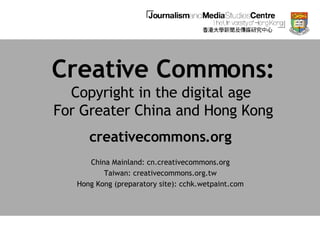Cc Hku
- 1. Creative Commons: Copyright in the digital age For Greater China and Hong Kong creativecommons.org China Mainland: cn.creativecommons.org Taiwan: creativecommons.org.tw Hong Kong (preparatory site): cchk.wetpaint.com
- 2. balance All Rights Reserved No Rights Reserved ? Creative Commons
- 3. purpose
- 4. license elements: Attribution No Commercial use No Derivative work Share alike
- 5. three expressions: Human-Readable: Commons Deed Lawyer-Readable: Legal Code Machine-Readable: Digital Code, Metadata
- 6. the licenses Licenses Deeds Metadata = Logo + Link Attribution Non-commercial No Derivatives (by-nc-nd) Attribution Non-commercial Share Alike (by-nc-sa) Attribution Non-commercial (by-nc) Attribution No Derivatives (by-nd) Attribution Share Alike (by-sa) Attribution (by) 6 variations
- 10. deed
- 11. legal code
- 12. metadata
- 14. Creative Commons International: in contact with 80 countries worldwide
- 15. 38 Countries have launched national CC licenses
- 16. People engage in flexible licensing overwhelmingly for reputational reasons Two-thirds choose to limit public use to noncommercial use only Two-thirds permit derivatives Most popular license elements
- 17. first court case
- 18. ˇ° In principle, Curry owns the copyright in the four photos, and the photos, by their posting on that website, are subject to the [Creative Commons] License. Therefore Audax should observe the conditions that control the use by third parties of the photos as stated in the LicenseˇThe claim [...] will therefore be allowed; defendants will be enjoined from publishing all photos that [Curry] has published on www.flickr.com, unless this occurs in accordance with the conditions of the License.ˇ± Curry v. Audax, District Court of Amsterdam ¨C March 9, 2006 , Interim measure, Case no. 334492 / KG 06-176 SR Amsterdam court ruling
- 20. CC uses in Mainland China China Open Resources for Education Yupoo Web 2.0 Start-up
- 21. CC Taiwan
- 22. examples in Taiwan Intellectual Property Office Ministry of Education Education Resources
- 23. more examples in Taiwan Taiwan Digital Art and Information Center Novel in Taiwan CC License Album in Taiwan CC License
- 24. other examples Magnatune Record Label license music in CC Jamendo Music Platform license music in CC
- 25. other examples MIT Open Courseware
- 26. local examples OpenRadio HK Daayu Web 2.0 Start-up
- 27. demonstration Creativecommons .org CC Search CC Mixter Education
- 28. This presentation contains elements or contributions from: Ben Cheng Catharina Maracke, Creative Commons International Creative Commons Austria/Public Voice Lab
- 29. Thanks! Rebecca MacKinnon [email_address] This work is licensed under the Creative Commons Attribution-Share Alike 3.0 Unported License. http://creativecommons.org/licenses/by-sa/3.0/


















![ˇ° In principle, Curry owns the copyright in the four photos, and the photos, by their posting on that website, are subject to the [Creative Commons] License. Therefore Audax should observe the conditions that control the use by third parties of the photos as stated in the LicenseˇThe claim [...] will therefore be allowed; defendants will be enjoined from publishing all photos that [Curry] has published on www.flickr.com, unless this occurs in accordance with the conditions of the License.ˇ± Curry v. Audax, District Court of Amsterdam ¨C March 9, 2006 , Interim measure, Case no. 334492 / KG 06-176 SR Amsterdam court ruling](https://image.slidesharecdn.com/cc-hku4113/85/Cc-Hku-18-320.jpg)










![Thanks! Rebecca MacKinnon [email_address] This work is licensed under the Creative Commons Attribution-Share Alike 3.0 Unported License. http://creativecommons.org/licenses/by-sa/3.0/](https://image.slidesharecdn.com/cc-hku4113/85/Cc-Hku-29-320.jpg)